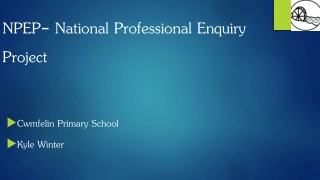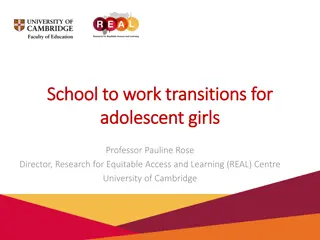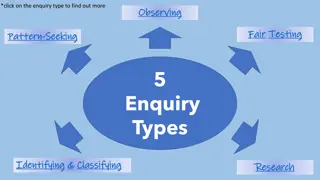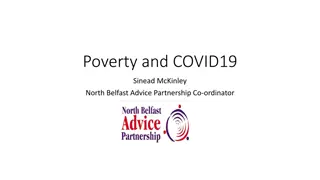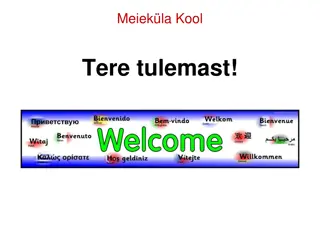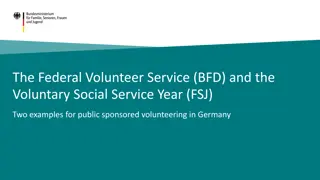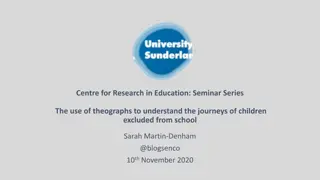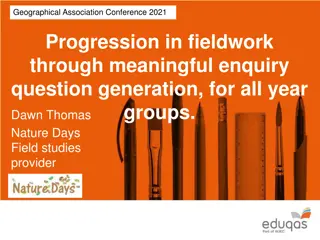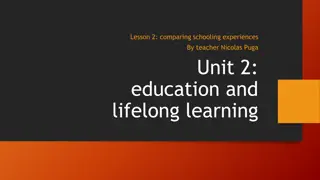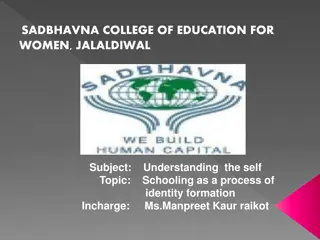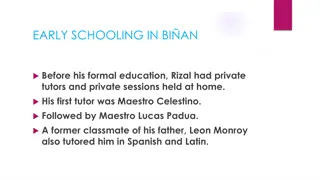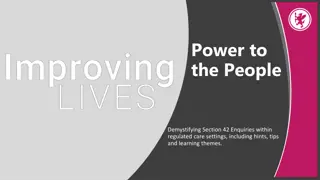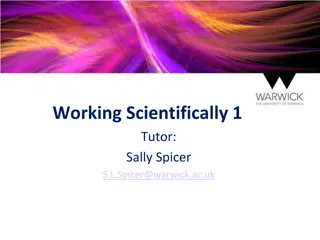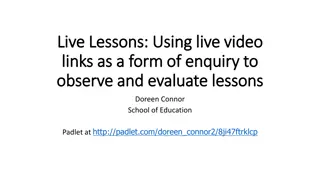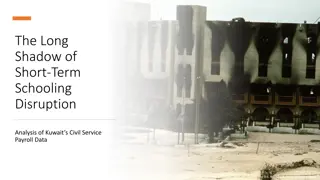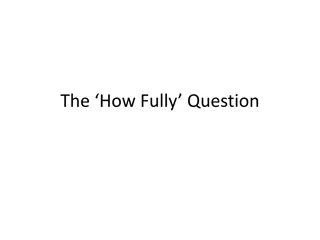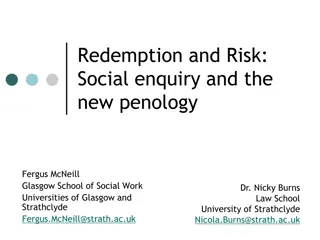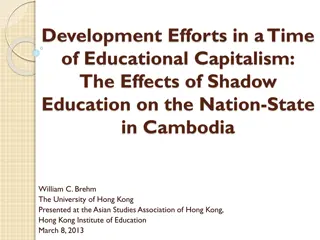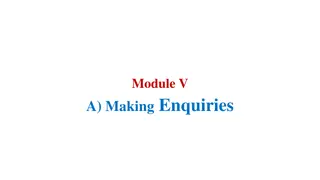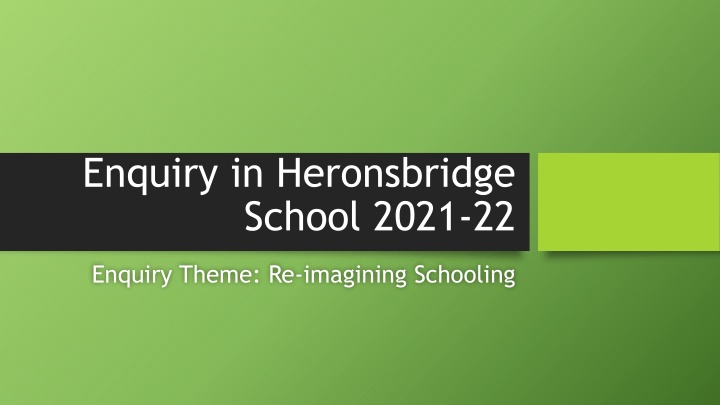
Re-imagining Schooling at Heronsbridge School: A Journey of Curriculum Transformation
"Explore how Heronsbridge School in 2021-22 is re-imagining schooling through Curriculum for Wales implementation, co-construction culture, and assessing pupil learning. Discover the methodology, professional development, and enquiry design shaping their educational approach."
Download Presentation

Please find below an Image/Link to download the presentation.
The content on the website is provided AS IS for your information and personal use only. It may not be sold, licensed, or shared on other websites without obtaining consent from the author. If you encounter any issues during the download, it is possible that the publisher has removed the file from their server.
You are allowed to download the files provided on this website for personal or commercial use, subject to the condition that they are used lawfully. All files are the property of their respective owners.
The content on the website is provided AS IS for your information and personal use only. It may not be sold, licensed, or shared on other websites without obtaining consent from the author.
E N D
Presentation Transcript
Enquiry in Heronsbridge School 2021-22 Enquiry Theme: Re-imagining Schooling
Enquiry Overview Since 2018, Heronsbridge school has been exploring Curriculum for Wales through it s ongoing involvement as both a Pioneer Curriculum and Professional Learning School. Developing Curriculum for Wales is a target on our School improvement Plan specifically curriculum design. To date we have identified our vision and explored what the Four Purposes look like for our learners. We have embedded the Four Purposes into our planning through enquiry And created AoLE groups to trial key areas of focus
Enquiry Culture Co-construction has been our way of working throughout our transformation journey, including teachers, leaders, governors, support staff and pupils. Schools as Learning Organisations (SLO) model has been utilised to support cultural changes needed in school to support the realisation of Curriculum for wales. The Professional Standards for Teaching and Leadership (PSTL) and Professional Standards for Assisting Teaching (PSAT) are used as a self evaluation resource to support personal development within specific areas appropriate to role, pupil needs and personal development needs
Question: The Pebble in our Shoe.. How do we know how well our pupils are learning in order to meet the four purposes?
Methodology/ Professional Development A reflective diary covering five weeks, involving six members of teaching staff who volunteered from each department in the school. The staff ranged from highly experienced Heads of Department to recently qualified staff. Their engagement was for their professional development as well as to reflect on ideas they were trialling within their own classrooms. To support School improvement targets
Enquiry Design Initially, the only information given was the enquiry question, a time scale of five weeks and a request that each weekly reflection was no longer than a paragraph, simply because we were mindful of additional workload. However, the staff involved requested a set format/ structure to follow. Then a simple proforma was discussed and circulated. Additionally, links were made with Professional Standards for Teaching and Leadership as well as the Schools as Learning Organisation Model , specifically the dimension establishing a culture of enquiry, innovation and exploration . From this context staff seemed more confident as it gave the why to the point of the research on a national and local context and was a collective approach with the same starting point and expectations. Reflection would be discussed as a group at a later date. Data was analysed for emerging themes, pedagogy and how practice could be shared whole school based on the enquiry question of, how do we know how well our pupils are learning in order to meet the four purposes?
Subsidiarity & teacher agency The vision for Curriculum for Wales 2022 is aspirational and to realise the Welsh Government s ambition for this vision, it affords substantially more flexibility and autonomy to teachers and schools, positions learners as central to curriculum decision making, promotes active forms of pedagogy . (Sinnema et al, 2020) The idea of autonomy for teachers, replacing the very prescriptive content-led approaches to teaching , as the current National curriculum, will take time, a cultural shift and training.
Subsidiarity & teacher agency In order for curriculum innovation to be successful, school leaders need to create an ethos for change that empowers teachers to experiment with the curriculum through the adoption of distributed forms of leadership (2015, Brundrett and Duncan (2015) The idea of teacher agency (Priestley, 2013) will require teachers to trial new ways of working to build the confidence to test ideas, retry and not be afraid to fail. This can only be achieved within a school climate of support and freedom and a have a go attitude.
Emerging Findings: Approach to enquiry Teachers very involved in the enquiry process listing both strengths and weaknesses in their practice as well as the learning of the pupils. Reflections honest with a number of frustrations listed. Sharing of practice is developing across departments due to the idea of stage not age.
Emerging Findings: Learning Environment How the non-negotiables regarding the school annual calendar impacts on teaching- annual reviews, mandatory training, individualised timetables for some pupils. However, events were also viewed as essential part of the school curriculum e.g St David s Day How staffing impacts on teaching and learning especially in a special school context. The coronavirus still impacting on classroom routines due to reduced energy within staff teams/ classrooms, due to staff cover or returning to work with the after effects of the virus, alongside the anxiety that it still causes. Reward systems using our Heron Heroes (Independent Izzy, Sustainability Sam, Opportunity Olli and Well-being Wynnie) which are directly linked to the four purposes and our corresponding school values, are highly motivating. Teachers have developed age/ stage appropriate ways to embed the four purposes.
Emerging Findings: Pedagogy Plenary sessions are encouraged whereby pupils are able to say what skills they have been developing- I m an opportunity Ollie because I can .. this can also be used for peer assessments. Fits in nicely for assessment of learning. For non-verbal pupils they are encouraged to select the appropriate visual of the Heron Squad for their learning. Accreditation for the older pupils is also linked to the four purposes which supports home learning and life experiences. Teachers have developed individual need-based learning opportunities to embed the four purposes- wellbeing is the main focus area for our more sensory learners. Staff have been trialling the use of coloured lights and feathers to introduce and end lessons focusing on one of our values. Real life experiences are being developed. Skills and knowledge are developed within the classroom and applied in a real context. Staff are becoming increasingly inventive in their pedagogy and adapting lessons and learning environments to engage all learners. Assessment for learning is integrated into lessons through our Heron Squad e.g Pupil A, you were an Independent Izzy because you counted to 10 on your own . In some classes evidence sheets now have pictures of the Heron Squad figures on them and pupils are encouraged to circle the one that best fits that activity. Creative ways of providing verbal and written feedback are being developed whole school. Some plenary sessions have varying types of physical praise, special claps, that pupils can choose pat on the back , whoosh etc
Emerging Recommendations School level Having a cross-section of staff across the school with varying experience has also proven useful as younger staff have been empowered by positive feedback from more experienced staff. More senior staff have new ideas to take back to their own classrooms to trial. Engaging in a whole school enquiry has presented opportunity for smaller scale class based enquiries. Teacher level Reflective journals seemed the less intrusive means of gathering evidence and far more personal. Teaching staff found the process useful as it helped them plan for the next steps and consider how to do things differently and how to improve on what was already working. Because there were no right or wrong answers there was greater freedom. Engaging in enquiry has presented new information on how to move forward especially regarding assessment for learning

